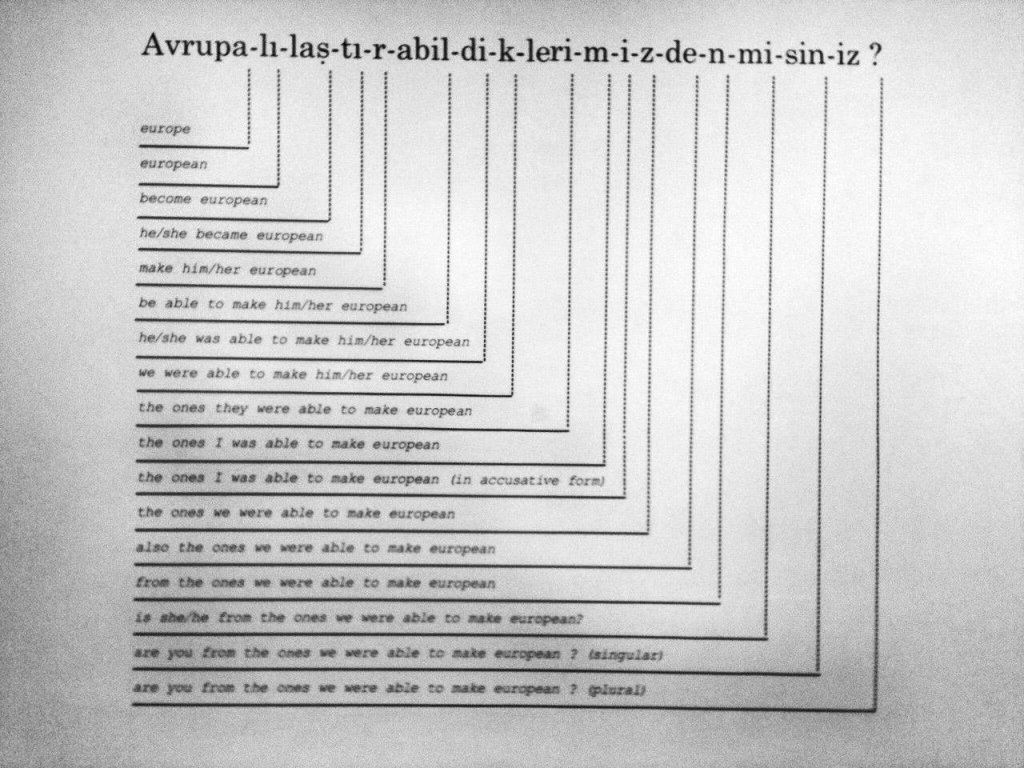The task of learning a new language while living in a foreign country can be a fun challenge. But it can also be stressful, and at times filled with fear, frustration and shame. I’m still waiting for the moment when Google announces that they have invented a hearing aid that automatically translates the language as your interlocutor speaks. (Haven’t they read The Hitchhiker’s Guide to the Galaxy? Why do they keep wasting their time with driverless cars?) Until then, us poor expats have to deal with the daily challenges of learning a new language. But if that language happens to be Turkish, fun is most definitely guaranteed. These are some of the idiosyncrasies you should be aware of if you want to learn or are in the process of learning this fascinating language.

- Atatürk is your best friend: Living in Turkey for a while means that you’ll end up knowing the life and legacy of the founding father of the Turkish Republic like the back of your hand. Among the many great things he did to modernize the country, the most useful for those of us used to the Roman script was the language reform. Considered one of the most radical and quickest linguistic reforms ever, this re-engineering of the alphabet took place within a few months at the end of 1920s. Not only did the Latin alphabet replace the Ottoman script, but over time loanwords from Arabic and Persian were replaced with Turkish equivalents. This can be a huge benefit for foreigners who already use this script: forget about the headache of a new alphabet and the misconception that you will have to write right to left. And for all of this, we will always be thankful to the “Father of Turks”.
- Add me: Turkish is an agglutinative language. Agglu-what? This means that Turkish words are formed by roots that have grammatical suffixes or endings that determine their meaning. What in other languages you may need many words to say can sometimes be expressed with just one word in Turkish. For example, a phrasal in English that would take six words (I am going to the school) in Turkish takes two (okula gidiyorum). Of course this comes to the point of ridiculousness in tongue twisters like “Çekoslovakyalılaştıramadıklarımızdan mısınız?” (“Are you one of those people whom we could not make to be Czechoslovakian?”).
- It’s the grammar, stupid: Turkish is an extremely regular language with a logical and methodical structure. There are next to no exceptions to the grammatical rules of this mathematical system. This should be a piece of cake, right? In theory. But it’s not as dreamy as it seems. While theoretically you may praise this regularity, it can still be difficult to implement. It will likely be easy if you were ever good at math in school. Or a Good Will Hunting of the languages.
- Pro·nun·ci·a·tion: The alphabet in Turkish is based on the Latin alphabet and most letters have pronunciations familiar to English speakers. This is probably the easiest part of the language, but still quite a hard one. You will see a dieresis appearing above the vowels Ö and Ü, a “soft g” with a hat that is not pronounced and the frightening “i” without a dot. It will take you some time and patience to stop writing the dot above every “i” you find.
- Find the harmony in yourself: Welcome to vowel harmony. This means that you have to couple your vowels in a certain order to make it sound “proper”. This constraint on which vowels may be found near each other may sound just random when you are a beginner. When asking your Turk friend why it is pahalı and not pahali, the answer “because it just sounds better” probably won’t help much. But believe me, after a while it will be so embedded in your brain that you’ll even find that it makes sense. Kind of.
- From the end start you must: Like a strange take on Yoda in Star Wars, you soon will realize that you can’t exactly read Turkish left to right. You kind of have to read all the sentence and go backwards to fully understand the meaning. You also have to wait for a person to finish their thought to find the verb that gives sense to the sentence. Be patient and may the force be with you.

- Fight the future: You’ll come across with the future tense in Turkish (gelecek zaman) when you cannot go any further with sentences like: “Tomorrow I call you.” The “fun” thing about it is that you write it as a long form, but in daily speech the first person singular and plural are always shortened. Instead of hearing -eceğim or –eceğiz, you will hear an elided -ecem or -ecez. They’re shortened in accordance with the harmony rules, don’t you dare forget about it. So you, you lazy student, will have to learn both, one for when you want to write properly and one for when you want to talk like a local.
- Gossiping: The so called story past tense form “-miş” is one of the more idiosyncratic tenses in Turkish. You add this suffix to your regular verb form when you want to describe something that you didn’t know or didn’t experience first hand. Or if you are gossiping about someone (dedikodu in Turkish). And believe me, that’s a thing that you’ll find yourself doing often in Turkish. Let’s say for example that my friend kissed a girl but he didn’t tell me. You can see how in other languages you would use forms like “I was told that”/ “I heard that”. In Turkish you add -miş at the end to indicate that you learnt that juicy dedikodu from someone else. That makes for a fun and/or equally weird situations: if it rained during the night but you were sleeping you’ll say yağmış (“seems like it rained”) but not yağdı (“it rained”), because, you know, you didn’t watch it. I will throw in there my theory of the origin of this — to my humble opinion — obsolete form: During Ottoman times messengers would return to the palace with the latest news of wars fought in foreign lands and legends of heroes sacrificing themselves for the empire. So they needed this pompous form to narrate these stories and legends. That’s a totally inaccurate explanation, but it’s my personal justification for why we are still using this form in the 21st century.
- Pardon my French: French culture and politics were a large influence in the late Ottoman empire and the early Turkish Republic. So much so that you will often come across some funny French words that have been “Turkified”. If you speak a romance language or are familiar with Molière’s language, you may be at an advantage. Pardon, asansör, bisiklet or isolasyon are just some that make me giggle.
- Fake it until you make it: There is a shortcut that has probably been used by every foreigner who has ever lived in Turkey. It’s considerably easy to get a basic understanding of Turkish where you can go to your local bakkal and buy food, or have a polite asansör conversation, in case you are lucky enough to have an elevator in your building. Once you reach to this point you’ll notice that Turks are so delighted that a foreigner is able to fumble through the language that they will let you off the hook and continue the conversation in English. Unfortunately this trick has an expiration date, and you will have to eventually confront the fact that if you want to live in the country and integrate yourself you need to learn the real Turkish beyond the combo “Nasılsın?İyiyim, sen nasılsın?” (How are you? I’m fine, how about you?)
- Tongue to tongue: Turks have a rather amusing sentence to express the best way to learn a foreign language: dil dile değmeden dil öğrenilmez (freely translated as “a language cannot be learned without touching tongues”). So, in summary, it’s not a bad idea to get yourself a Turkish boyfriend or girlfriend. This will boost your Turkish abilities to infinity and beyond.
To sum up, we can say that Turkish is easy. Or seems easy enough. Well…let’s be frank, that’s not completely true. For a romance or Germanic language speaker, Turkish is a mid-level difficult language like Russian or Finnish (more difficult than Italian and Portuguese, but less difficult than Japanese and Mandarin). Maybe it’s time to accept that the Turkish language is just different than yours without having to give in to the belief that it’s extremely difficult — let alone impossible — to learn. So, hadi, go have fun and give Turkish a try!
Santiago Brusadin is a contributor to Yabangee












good luck with that!
yep…..
As a Turkish person, I tried to learn Mandarin and Thai and struggle enough when I was living in China and Thailand. I always wonder how foreigners are doing in Turkey. This article definitely gave me a chance to understand
FANATIKLESTIREMEDIKLERIMIZDENMISINIZ ??? :)) hahaha
Not an expert about linguistics but here is my 2 cents. The hardness of any foreign language depends on your mother tongue. When I was in Japan, I found it relatively easy to pronounce the words. Grammar was similar to Turkish also. (verb at the end with agglutinations). Alphabet (esp. Kanjis) are pain in the *head* though 🙂
Nicole Adam: it sounds rather fascinating to me too… and in my opinion (and for my experience of learning foreign languages) it doesn’t depend on the language itself, if easy or difficult, but on the learner: how strong and deep your interest is for the language you have choosen to learn!!!
it is not what it looks like. It may seem difficult to learn. But it is not, it is just challenging. the best thing you need to do is just make Turkish friends and tend to speak Turkish as much as you can. 😉
Note to the editor/webdesigner: interesting article but the pictures are too small. Would be nice to have a bigger version come up upon clicking.
Reading the Turkish proverb (dil dile değmeden dil öğrenilmez) in the last item as an advice for French kiss must be a joke or a funny misunderstanding.
“Dil” means “heart” (gönül) as well; so the prerequisite mentioned here is just an emotional interaction (of hearts/souls, i.e. symphathy).
(for sure, a love affair is an optional benefit 🙂 )
[…] Türkçe. I spoke four languages before arriving here, and I honestly thought I would never learn Turkish. I was stuck for two painful years in what I call the “Nasılsın? İyiyim” zone. I can’t say that I’ve mastered the language – very far from it – but now at least I can understand the general topics of a conversation and even participate if I don’t shy away. I definitely feel more integrated now that I’ve gotten used to – and even begun to love – this peculiar language. […]